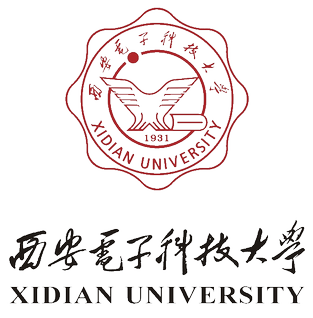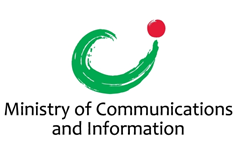India's telecommunication network is the second largest in the world by number of telephone users with 1179.49 million subscribers as on 31 January 2021. It has one of the lowest call tariffs in the world enabled by mega telecom operators and hyper-competition among them. India has the world's second-largest Internet user-base with 747.41 million broadband internet subscribers in the country.

Xidian University is a public research university in Xi'an, Shaanxi, China, that is administered by the Ministry of Education of China. Xidian focuses on electronics and information education and research, and has programs covering engineering, computer science, management, economics, liberal arts and social sciences. Particularly, U.S. News & World Report in 2020 ranked its computer science at 8th nationally and 22nd globally. Xidian is a Chinese Ministry of Education Double First Class Discipline University, with Double First Class status in several disciplines. It is also funded by Project 211.

Rashtreeya Vidyalaya College of Engineering is an autonomous private technical co-educational college located in Bangalore, Karnataka, India. RVCE is recognized as center of excellence under Technical Education Quality Improvement Program by Government of India.

Indian Institute of Engineering Science and Technology, Shibpur is a public technical and research university located at Shibpur, Howrah, West Bengal. It is recognised as an Institute of National Importance under MHRD by the Government of India. It is controlled by the Council of National Institutes of Technology.
The Telecommunication Engineering Center is a body under telecom commission and a nodal agency of the Department of Telecommunications, Ministry of Communications and Information Technology, Government of India which is responsible for drawing up of standards, generic requirements, interface requirements, service requirements and specifications for telecom products, services and networks.

Satyan Pitroda popularly known as Sam Pitroda is an Indian telecommunication engineer, inventor and entrepreneur. He was born Titlagarh in the eastern Indian state of Odisha to a Gujarati family. He is popularly known as the Father of India's Computer and IT Revolution as he helped Prime Minister Rajiv Gandhi in bringing computerization as an advisor to the PM. He was also an advisor to the PM during Dr. Manmohan Singh's tenure.

The Department of Management Studies, IIT Delhi, also known as DMS IIT Delhi, is the school of management education and research in Indian Institute of Technology, Delhi. The department established in 1993 by an amendment in IIT Delhi statutes, currently runs a two-year full-time MBA programme with focus on Management Systems, a two-year full-time MBA with focus on Telecommunication Systems Management under the aegis of Bharti School of Telecom Technology and Management and a three-year on-campus evening MBA programme with focus on Technology Management.
The Indian Railways Institute of Signal Engineering and Telecommunication, Secunderabad is an Institute based on Signal Engineering and Telecommunications. Located in Secunderabad, this institute is run by the Ministry of Railways (India), Indian Railways in 1957 as a subsidiary of Indian Railways.

The Ministry of Defence (MoD) is charged with coordinating and supervising all agencies and functions of the government relating directly to national security and the Indian armed forces. The President of India is the ceremonial commander-in-chief of the armed forces of the country. The Ministry of Defence provides policy framework and resources to the armed forces to discharge their responsibility in the context of the defence of the country. The Indian Armed Forces and Indian Coast Guard under the Ministry of Defence are primarily responsible for ensuring the territorial integrity of India.
The Ministry of Communication and Information Technology was an Indian government ministry. It was bifurcated into Ministry of Communications and Ministry of Electronics and Information Technology in July 2016. It contained three departments viz. Department of Telecommunications, Department of Electronics and Information Technology and Department of Posts.

The Ministry of Communications and Information is a ministry of the Government of Singapore. It is in charge of information and communications technology, the media and design sectors, public libraries, as well as the Government's information and public communication policies.

The Ministry of Defence, is an executive ministry of the Government of Pakistan, tasked in defending Pakistan's national interests and values at home and abroad. It plays a major supporting role to the Pakistan Armed Forces and coordinates with a range of domestic, foreign and inter-governmental bodies.

Changchun University of Science and Technology is a key university in Changchun, Jilin, China, previously known as Changchun Institute of Optics and Fine Mechanics. It was founded by Wang Daheng in 1958.

Jabalpur Engineering College (JEC) is an institute located in Jabalpur, Madhya Pradesh, India. It is the oldest technical institution in central India and the 15th-oldest in India. It is the first institute of India to have started the Electronics & Telecommunication engineering education in the country, and also the last educational institution to be set up by the British in India. The Government of Madhya Pradesh is converting it into Technical University.
The Research Designs & Standards Organisation (RDSO) is an ISO 9001 research and development organisation under the Ministry of Railways of government of India, which functions as a technical adviser and consultant to the Railway Board, the Zonal Railways, the Railway Production Units, RITES, RailTel and Ircon International in respect of design and standardization of railway equipment and problems related to railway construction, operations and maintenance.
Bharat Nirman is an Indian business plan for creating basic rural infrastructure. It also comprises projects on irrigation, roads, housing, water supply, electrification and telecommunication connectivity.
The Ministry of Electronics and Information Technology is an executive agency of the Union Government of the Republic of India. It was carved out of the Ministry of Communications and Information Technology on 19 July 2016 as a standalone ministerial agency responsible for IT policy, strategy and development of the electronics industry.

Kunnath Puthiyaveettil Padmanabhan Nambiar DIC (Lond), FIEE (Lond), CEngg (Lond.), more popularly known as K.P.P. Nambiar, was an Indian industrialist and technocrat, known for his work in the field of industrial development and technology. He was awarded Padma Bhushan by Government of India for his contributions to the field of technology in 2006.
Information Technology in Sri Lanka refers to business process outsourcing, knowledge process outsourcing, software development, IT Services, and IT education in Sri Lanka. Sri Lanka is always ranked among the top 50 outsourcing destinations by AT Kearney, and Colombo and ranked among "Top 20 Emerging Cities" by Global Services Magazine. The export revenue of this industry grew from USD 213 million in 2007 to USD 1089 million in 2019.

Telephone / Telecom Advisory Committees (TAC) is a high level Indian government body made up of members of parliament and other members nominated by the Ministry of Communications and Information Technology to address issues concerning telecommunication in India. Looked upon as a privileged panel, the Telephone Advisory Committees, constituted by the Ministry of Communications and Information Technology (India) of the Government of India to serve as a vital feedback mechanism for improvement of services in the Telecommunications sector by the Department of Telecommunications












